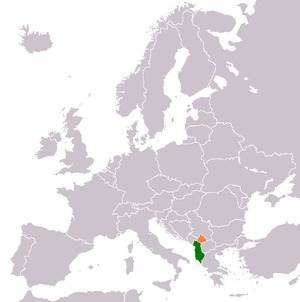Unification of Albania and Kosovo

The unification of Albania and Kosovo[a] is a political idea, revived after Kosovo declared independence in 2008.[1] This idea has been connected to the irredentist concept of Greater Albania.[2][3][4] As of the 2010s, 93% of Kosovars are ethnic Albanians.
History[]
During the 1981 protests in Kosovo, Yugoslavia feared a potential unification of Kosovo with Albania.[5] In the early 1990s, Albanian politicians' statements were often contradictory on the possibility.[6] Political activist Ukshin Hoti, founder of the Party of Albanian National Union, whom the Serbian police eventually killed in 1999, was an ardent supporter of the unification of Kosovo with Albania.[7] In 2001, Arben Imami, a politician from the Democratic Party of Albania, stated that unification of Kosovo with Albania should be a party goal, but this statement was met with criticism within his own party.[8]
The Ahtisaari Plan conditioned Kosovo's independence by adopting a multiethnic “Kosovar,” rather than an Albanian identity.[9] Still, Gallup surveys revealed that 75% of Kosovo Albanians would prefer to live unified with Albania in a single country. The same support was seen in Albania where 68% of the citizens of Albania preferred a unification of Albania with Kosovo.[9] In 2017, some mainstream Albanian politicians, such as Ben Blushi, have come out in support of unification.[10] In Kosovo, the political party Vetëvendosje supports unification. A political union between the two states may bring Albania into diplomatic conflict with Serbia, which regards Kosovo as its de jure territory.
In May 2019, president Hashim Thaçi suggested a referendum on the unification of Kosovo and Albania, if the slow integration process by the European Union does not accelerate. However, some simply view this as an attempt by Thaçi to “keep himself in the spotlight”, without any real intention of uniting the two countries.[11]
Public opinion[]
This section needs expansion. You can help by . (August 2019) |
Polls supporting unification of Kosovo with Albania notwithstanding, the goal of Albanian politicians has been entrance into NATO and the EU, rather than national unification.[12] Some Roman Catholic and Orthodox Christian Albanians fear that any possible unification of Balkan areas that bring sizable numbers of Muslims into the new state may lead to an increasing "Muslimization" of Albania.[13]
According to a 2019 poll by Open Society Foundations that covered 2504 respondents in both countries, 79.4% of Kosovar Albanian respondents were in favor of unification between Albania and Kosovo, compared to 82.9% of the respondents in Albania. When asked whether they would be willing to pay a tax for unification, 66.1% of respondents in Kosovo agreed, compared to only 45.5% in Albania.[14]
See also[]
Notes[]
- ^ Kosovo is the subject of a territorial dispute between the Republic of Kosovo and the Republic of Serbia. The Republic of Kosovo unilaterally declared independence on 17 February 2008. Serbia continues to claim it as a part of its own sovereign territory. The two governments began to normalise relations in 2013, as part of the 2013 Brussels Agreement. Kosovo is currently recognised as an independent state by 97 out of the 193 United Nations member states. In total, 112 UN member states have recognised Kosovo at some point, of which 15 states later withdrew their recognition.
References[]
- ^ Sharon L. Wolchik; Jane Leftwich Curry (2011). Central and East European Politics: From Communism to Democracy. Rowman & Littlefield. p. 390. ISBN 978-0-7425-6734-4.
Undoubtedly, Kosovo's independence has revived the idea of the national unification of Albanians
- ^ Tristan James Mabry; John McGarry (2013). Divided Nations and European Integration. University of Pennsylvania Press. p. 175.
- ^ Lenard J. Cohen; Jasna Dragović-Soso (2008). State Collapse in South-Eastern Europe: New Perspectives on Yugoslavia's Disintegration. Purdue University Press. p. 194.
- ^ Winston Langley (2013). Encyclopedia of Human Rights Issues Since 1945. Routledge.
- ^ Howard Clark (2000). Civil Resistance in Kosovo. Pluto Press. pp. 44–. ISBN 978-0-7453-1569-0.
- ^ Geert-Hinrich Ahrens (6 March 2007). Diplomacy on the Edge: Containment of Ethnic Conflict and the Minorities Working Group of the Conferences on Yugoslavia. Woodrow Wilson Center Press. p. 323. ISBN 978-0-8018-8557-0.
CSCE mission of May 1992 judged that “on the question of the relations with Albania and of a possible unification, the answers were unclear, vague, and sometimes contraddictory
- ^ Heike Krieger (12 July 2001). The Kosovo Conflict and International Law: An Analytical Documentation 1974-1999. Cambridge University Press. p. 75. ISBN 978-0-521-80071-6.
- ^ Maria Koinova (1 July 2013). Ethnonationalist Conflict in Postcommunist States: Varieties of Governance in Bulgaria, Macedonia, and Kosovo. University of Pennsylvania Press. p. 197. ISBN 978-0-8122-0837-5.
- ^ a b Tristan James Mabry; John McGarry; Margaret Moore; Brendan O'Leary (30 May 2013). Divided Nations and European Integration. University of Pennsylvania Press. p. 182. ISBN 978-0-8122-4497-7.
- ^ https://koha.net/?id=27&l=153816
- ^ "Thaci's Pan-Albania Union Plea Scorned as Populism". Balkan Insight. 2019-06-03. Retrieved 2019-06-09.
- ^ Henry H. Perritt (2010). The Road to Independence for Kosovo: A Chronicle of the Ahtisaari Plan. Cambridge University Press. p. 94. ISBN 978-0-521-11624-4.
- ^ Lesser, Ian O.; Larrabee, F. Stephen; Zanini, Michele; Vlachos-Dengler, Katia (2001). Greece's new geopolitics. Santa Monica: Rand Corporation. p. 51. ISBN 9780833032331.
- ^ Demi, Agron; Çeka, Blendi (2019). Kosovo-Albania Interaction, knowledge, values, beliefs, cooperation and unification (PDF) (Report). Open Society Foundations. p. 38-39. Retrieved 2021-04-09.
External links[]
- Albanian irredentism
- Albanian nationalism in Kosovo
- National unifications
- Political movements in Albania
- Political movements in Kosovo
- Albania–Kosovo relations